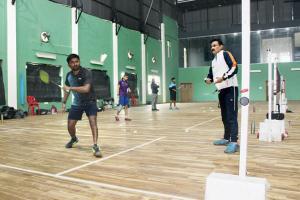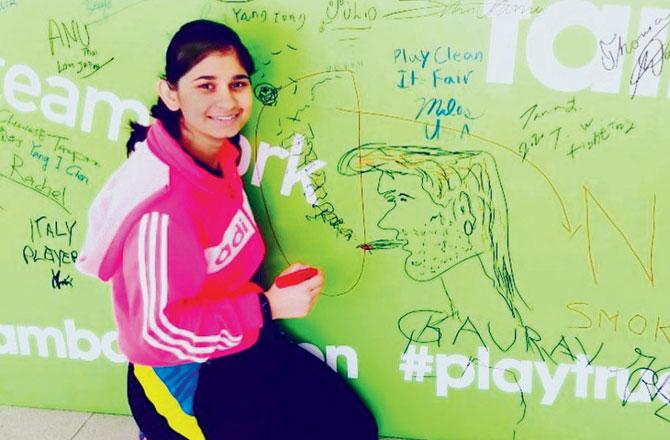The first professional para badminton academy to open in India is the product of a dream Gaurav Khanna harboured. The Dronacharya awardee shares what it took to put differently-abled athletes first

Nilesh Gaikwad from Aurangabad, ranked 25 in the world, trains with coach Gaurav Khanna at the academy
From the time Gaurav Khanna, 44, took over the role of chief coach of the Indian para badminton team in 2015, he has been pulling all stops to bring his athletes on a level playing field. “I have wanted to provide a common platform for them to train, which is why I would invite them to Lucknow, where we would practice at Guru Govind Singh Sports College. There was a dire need for it [equal opportunities]. But, even to train at the college, we needed a slew of permissions,” says the Dronacharya awardee.
ADVERTISEMENT

Palak Kohli became the world’s youngest para badminton player to qualify for the Tokyo Paralympics
His job will be a little easier now. India is set to see the opening of its first para badminton academy, in Lucknow next month. The fully equipped facility, eponymously titled Gaurav Khanna Excellia Badminton Academy (GKBA), has professional players from across the country, including Maharashtra, and Punjab on its roster. It is India’s first professional academy dedicated to the sport and is said to be on par with international standards. Asheesh Pathak, owner, Excellia School, offered the space in the school premises for players to train. The auditorium was renovated to create the facility. “This idea has been brewing in my mind for a decade. It took root when I was head coach of the deaf badminton team. Despite their disability, they showcased astounding talent and zeal, and it was important that we harness it.” Khanna says every para badminton player who enters the sport, invariably nurtures the dream of representing India at elite level badminton tournaments like Asian Games and the Olympics. The academy will provide experienced coaches and master trainers, many of whom have cleared a disability sports course from the Lakshmibai National Institute of Physical Education, Gwalior. “Every academy is designed for able-bodied players, and para players somehow get accommodated there.
But here, we wish to give first priority to para athletes.”
He says that they will also put a cap on the number of players being admitted as they only want committed athletes to enrol. Since it’s an advanced training academy, it will also touch on aspects such as medical science, sports psychology and physiotherapy.
For years, Khanna was on the lookout for sponsors who could fund his dream of an academy. “Those who invest naturally expect returns. I vigorously searched, but unfortunately, I couldn’t find any takers for para athletes. The Excellia School founders were a godsend and are happy to offer their premises and infrastructure.”
Nilesh Gaikwad from Aurangabad, with a world ranking of 25, is one of the players to enrol at the academy. Born to a family of farmers, Gaikwad lives with polio. “We are staying in a rented accommodation close to the academy and our training is quite intense. It will get even more rigorous once the coaching starts full throttle,” he says.
Trained under Khanna, Gaikwad has a number of medals to his name. He won the gold (singles) and bronze (mixed doubles ) at the Uganda Para Badminton International 2017 and the silver medal at the Asian Youth Para Games Dubai 2017. He is currently training for the Tokyo Olympics. Some players are also being supported by GoSports Foundation, Olympic Gold Quest, and Welspun Foundation.
Palak Kohli, an 18-year-old para athlete from Punjab, has been living in Lucknow since before the lockdown. “Because indoors was considered dangerous initially, we used to train outdoors, and it was a whole new experience because suddenly you’d have to battle the vagaries of weather and uneven ground. It just made us stronger,” she says. According to Kohli, the advanced training will build confidence for when the athletes compete at the international arena. “Beating players from China, Japan and Indonesia requires next-level skill because those players have been training since they were kids.”
Khanna is optimistic about the road ahead. “I don’t see my students as differently abled and neither do they. Their training is at par with able-bodied players.”
Keep scrolling to read more news
Catch up on all the latest Crime, National, International and Hatke news here. Also download the new mid-day Android and iOS apps to get latest updates.
Mid-Day is now on Telegram. Click here to join our channel (@middayinfomedialtd) and stay updated with the latest news
 Subscribe today by clicking the link and stay updated with the latest news!" Click here!
Subscribe today by clicking the link and stay updated with the latest news!" Click here!






